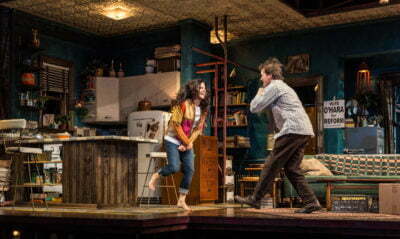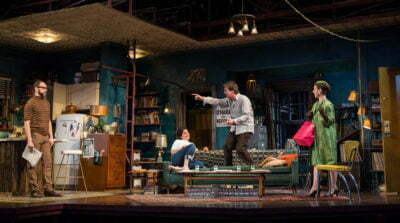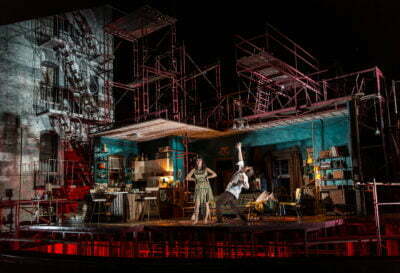The Sign in Sidney Brustein’s Window
 By Lorraine Hansberry
By Lorraine Hansberry
Directed by Anne Kauffman
Produced by Goodman Theatre, Chicago
Lorraine Hansberry Needed Better Friends
At one point in The Sign in Sidney Brustein’s Window, the title character mockingly describes his playwright upstairs neighbor as attempting to break the shackles of Ibsenesque naturalism. The Goodman’s supplementary materials for the show say it is reasonable to interpret the neighbor as Edward Albee, whom Hansberry considered emblematic of the cynicism and despair that was trendy at the time, and which she loathed. Hansberry, therefore, firmly in the tradition of Ibsen, wrote a mostly naturalistic drama exploring the conflict between pragmatism and “being true to oneself,” whatever that means, featuring the kind of people she was best acquainted with. Unfortunately, Hansberry was beset by depression and writers’ block brought on by cancer during her years of writing Sidney Brustein’s Window, causing the play to remain unfinished nearly until she was dead. The result is that she stuffed the play full of her musings on whatever was on her mind when she was able to get some writing done over a period of several years, but put the words into the mouths of characters she deliberately made unlikeable and boring as a jab at other playwrights and literary critics.

The setting is Greenwich Village, 1964. Ulcer-ridden Jew Sidney Brustein (Chris Stack) has just closed his hopeless attempt at a country-themed venue which he insisted was not a nightclub, but already has his next brilliant scheme in mind: a weekly newspaper. His wife, Iris (Diane Davis), is appalled, but Iris’s opinion means nothing to Sidney. She’s a less-than mediocre actress who is too ridden by anxiety to even go to auditions, and he delights in reminding her of this. But Sidney intends to keep his paper completely non-political, to the chagrin of his friend, Wally O’Hara (Guy Van Swearingen), who is running for city office as a reformer. One of Sidney’s busboys died from an overdose recently, which Wally blames on the patronage-hired cops tolerating the heroin trade, and which he claims he’ll put a stop to. Eventually, through a combination of guilt, ego-baiting, and offering him a chance to prove Iris wrong again, Sidney’s friends inspire him to join the movement.

While that’s happening, Alton (Travis A. Knight), a light-skinned black communist, has proposed marriage to Iris’s sister, Gloria (Kristen Magee). Sidney and Iris think it would be kinder to not tell Alton that Gloria is a high-price prostitute whose job regularly takes her to the West Coast, and Iris’s conservative sister, Mavis (Miriam Silverman) agrees that’s for the best. Not that Mavis was thrilled about having Alton as a brother-in-law, but she decides it would still be an improvement in Gloria’s life. At one horrible dinner party, Alton gets into a conflict with David (Grant James Varjas), the weird gay playwright, in which Alton is homophobic, David tells Alton that black people enjoy bearing a cross, and Sidney claims that gay people also enjoy their martyrdom. This kind of social interaction if typical for these characters, but they use highly intellectual language to insult each other. Mavis finds it intolerably smug.

Mavis is right. While I was looking through Lorraine Hansberry’s informal autobiography, To Be Young, Gifted, and Black, I was amazed by how many quotes from her correspondence, essays, and rhetorical exercises Hansberry dropped into the play without adjusting them to sound like motivated character dialogue. The people in Sidney Brustein’s Window usually sound like they’re quoting blocks of text from a different context because that’s exactly what they’re doing. But the characters’ speech is worse when it’s original to the play. Consider this monologue from Sidney after Wally tells him to take a pill for his ulcer: “In the ancient times, the good men among my ancestors, when they heard of evil, strapped a sword to their loins and strode into the desert; and when they found it, they cut it down—or were cut down and bloodied the earth with purifying death But how does one confront these thousand nameless faceless vapors that are the evil of our time?” And so on. In that scene, Sidney is being overly dramatic to make a point about Wally’s politics, but he does that all the time, to everybody he interacts with, and it’s annoying.

It doesn’t help the production that the play was written in three acts, but director Anne Kaufman combined the first two so there would only be one intermission. Nor does it help that the actors struggle to find anything other than smug depression in their characters. Querulousness of the type often found in teens and people in their early twenties is even less attractive in people who are around thirty, and instead of an Ibsen hero being awakened to his true self, Sidney just seems to switch positions randomly, while being a verbose ass the whole time (Sidney is a fan of Shaw). There is one brilliant scene, though, in which Silverman’s Mavis shatters Sidney’s arrogant presumptions. Despite the play being long and tiresome to watch, I will say to its credit that it may lead audiences to seek out more of Hansberry than they know just from A Raisin in the Sun. She was well-informed and had interesting opinions on a variety of subjects, but a mish-mash of them presented as a drama isn’t the best way of learning about them, even if it is an entry-point. As usual, the Goodman has a beautiful and evocative set, in this case designed by Kevin Depinet. But if they were going to devote a large amount of resources to post-Raisin Hansberry (this productions part of a celebration dedicated to her), I wish they would have made bolder choices in adapting her, or accepted some of her fragments instead of something a dying author prioritized finishing over polishing.
Somewhat Recommended
Jacob Davis
Reviewed May 9, 2016
This show has been Jeff recommended.
For more information, see The Sign in Sidney Brustein’s Window’s page on Theatre in Chicago.
Playing in the Albert at the Goodman Theatre, 170 N Dearborn Ave, Chicago. Tickets are $20-75; to order, call 312-443-3800 or visit GoodmanTheatre.org. Performances are May 24 at 7:30 pm, Wednesdays at 7:30 pm, Thursdays at 2:00 pm and 7:30 pm, Fridays at 8:00 pm, Saturday at 2:00 pm and 8:00 pm (evening performance only on May 14), and Sundays at 2:00 pm and 7:30 pm (no evening performance on May 15 and 29) through June 5. Running time is two hours and forty minutes with one intermission.

